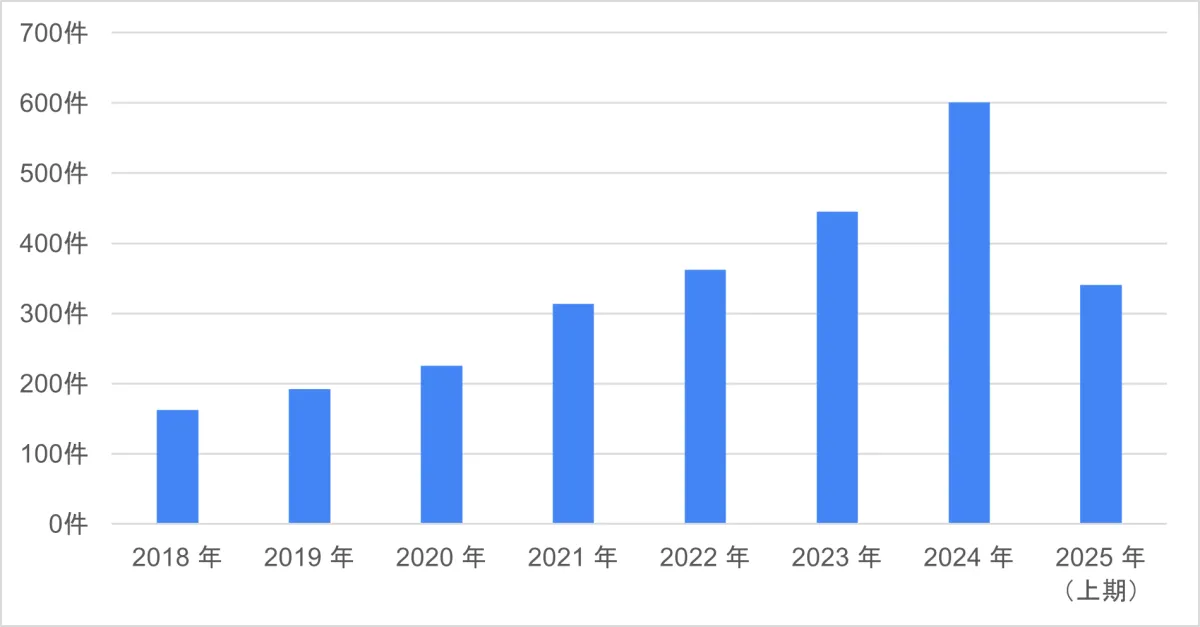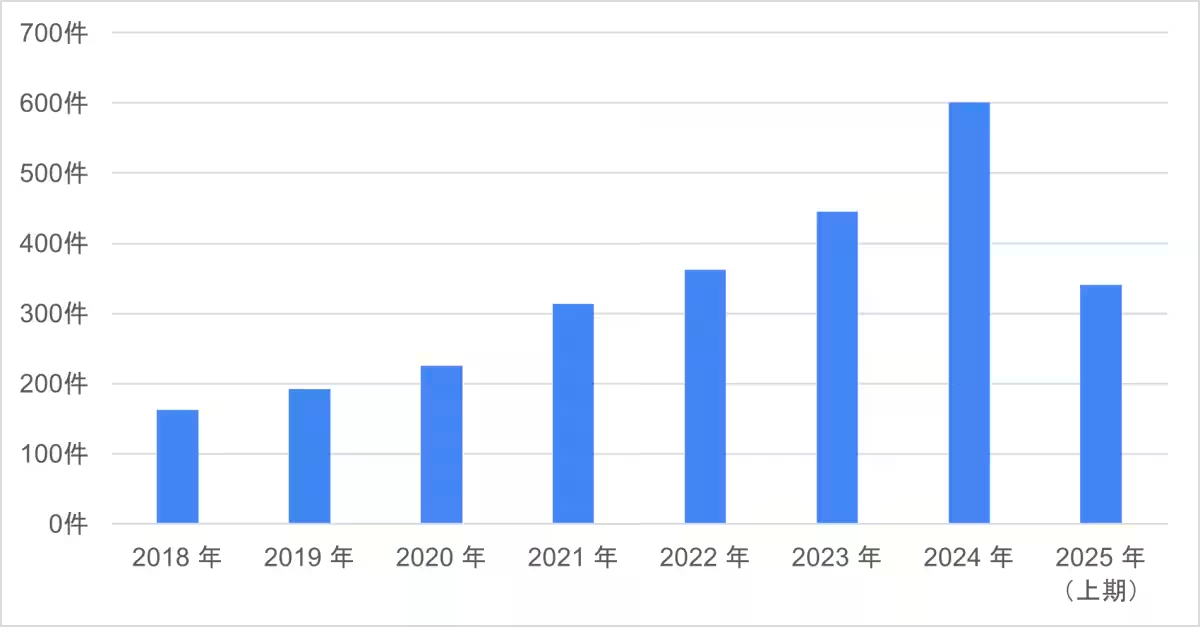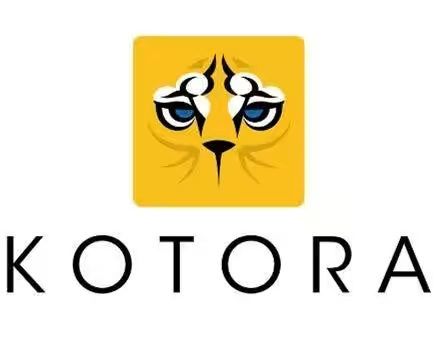

Analyzing the M&A Recruitment Market Trends for Mid-2025
Understanding the M&A Recruitment Market for 2025
The company Kotora, based in Minato-ku, Tokyo, has conducted a comprehensive analysis of the M&A recruitment market, evaluated through job listings up to the first half of 2025. As we delve into this topic, we find that several key players and market dynamics are shaping the landscape of mergers and acquisitions (M&A) in Japan.
Current Landscape of M&A Recruitment
The recruitment market for M&A professionals continues to grow, driven by the increasing number of M&A transactions among Japanese companies, particularly in response to the succession crises faced by small to medium enterprises (SMEs). As reported by the Small and Medium Enterprise Agency, registered financial advisory and brokerage firms have risen to 2,841 as of February 18, 2025. This is a significant increase from 930 in the 2010s to 1,593 in the 2020s, indicating a robust market evolution.
At Kotora, the demand for M&A-related positions has also shown a growing trend. Notably, there is an emphasis on the recruitment of professionals even without prior experience, highlighting the market's potential for nurturing fresh talent.
M&A Related Companies and Job Functions
The demand for M&A professionals is primarily concentrated in the following sectors:
- - M&A brokerage firms
- - M&A boutiques
- - Financial Advisory Services (FAS)
- - Investment banks
- - M&A divisions within corporate companies
Job functions in these organizations include:
- - Financial Advisory (FA)
- - Due Diligence
- - Valuation
- - Post-Merger Integration (PMI)
- - Strategic Planning
The surge in job openings is particularly apparent in M&A brokering and advisory roles, reflecting the multifaceted demand across various sectors rather than being confined to specific areas.
Essential Skills for M&A Professionals
M&A positions require a diverse set of skills tailored to the job functions:
For M&A Brokerage:
The most sought-after attributes are sales skills and an understanding of finance. Establishing trustful relationships with SME owners is crucial for securing new deals.
Additionally, candidates should have a certain level of financial acumen to interpret balance sheets and profit/loss statements, as this ability underpins valuation justifications.
For Financial Advisory (FA):
FA roles predominantly prioritize financial skills over sales orientation. Expertise in financial analysis, modeling, and valuing companies is essential. Candidates with experience in financial modeling and valuation or LBO (Leveraged Buyout) loan transactions are particularly appealing.
Moreover, those who have experience in financial due diligence will find their profiles favored, as they align closely with FAS tasks. Possessing certifications like CPA (Certified Public Accountant) or USCPA can significantly enhance a candidate's standing.
PMI and Strategy Roles:
Positions in PMI and strategy focus on the integration process around M&A transactions while establishing and executing corporate strategies. Candidates need to possess foresight on how M&A can transform and enhance company growth post-deal.
Factors Driving the Expansion of the M&A Market
The rising trend of M&A through private equity (PE) funds is a notable development. According to the SME Agency, an increasing number of small businesses face succession challenges due to aging owners. In this context, companies increasingly turn to M&A as a means for business continuity. This situation significantly bolsters the M&A brokerage market.
Moreover, there's a noticeable rise in what is termed "growth strategy M&A," wherein companies pursue acquisitions to bolster their competitiveness and expand their operations beyond organic growth constraints.
The Role of PE Funds
The influence of PE funds in facilitating M&A transactions is gaining traction, particularly in restructuring and IPO support for small firms. The presence of PE funds as growth enablers is becoming more pronounced, creating a vibrant ecosystem for M&A.
Corporate Carve-Out Trends
On the corporate front, there's an upswing in corporate carve-outs and TOB (Tender Offers) by listed companies. Companies are increasingly focused on shedding non-core businesses to concentrate resources on core areas for profitability.
Historically, large transactions were primarily led by major investment banks, focusing on top firms across key sectors. However, there is now a burgeoning interest among mid-tier companies, thereby opening up business opportunities for advisors and brokerage firms operating at various levels of the market.
Shifts in Japanese Market Priorities
Another major trend is the shift towards prioritizing shareholder value across the Japanese market. Noteworthy is KKR's recent announcement to invest JPY 1 trillion into Japan over the next decade, which has generated significant interest. Furthermore, the June 2025 tender offer by Toyota Group to delist Toyota Industries Corporation represents a shift in governance awareness towards maximizing shareholder benefits.
This shift enhances Japan’s market appeal to overseas institutional investors, creating a dynamic investment landscape.
Forecast for the M&A Market in Late 2025
Looking ahead to the latter half of 2025, we anticipate that the activity surrounding PE funds will escalate. Businesses are increasingly establishing dedicated teams to collaborate with PE funds, marking a clear turn towards enhancing PE engagement.
We expect to see a corresponding rise in demand for professionals aiming for advisory positions within PE funds, reflecting a significant shift in employment trends in the M&A sector. As the market evolves, those transitioning from M&A brokerage to FA roles will likely become more prevalent, further enriching the talent pool available to PE funds.
For consultants and firms like Kotora, these trends present opportunities to support M&A professionals in navigating their careers in a fast-evolving market, underscoring the importance of adaptability and readiness to meet new demands in skills and expertise.
About Kotora
Kotora is dedicated to fostering growth through human resources, aiding professionals and enterprises alike. We offer comprehensive solutions, focusing on the recruitment and development of professional talents across various sectors.
Headquarters: 1-3-1 Azabudai, Minato-ku, Tokyo
CEO: Rika Ohnishi
Established: October 2002
Capital: 100 million yen
Website: Kotora



Topics Business Technology)










【About Using Articles】
You can freely use the title and article content by linking to the page where the article is posted.
※ Images cannot be used.
【About Links】
Links are free to use.